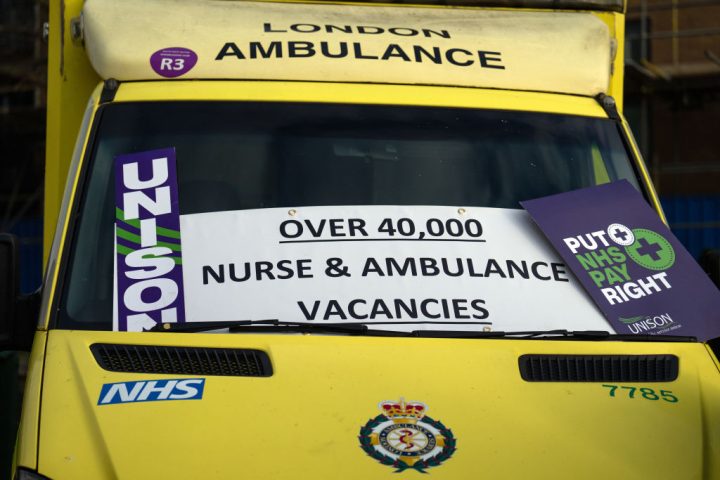The nursing and ambulance strikes may soon be over. Ministers have this afternoon agreed a pay deal with trade unions representing nurses and ambulance workers that consists of a one-off payment covering 2022/23, and a pay deal for the 2023/24 year.
Members of these unions will get 2 per cent of their salary for 2022/23, on top of the 4 per cent raise for this year, along with a one-off ‘NHS backlog bonus’ worth at least £1,250 per worker. Then for 2023/24, there will be a 5 per cent consolidated increase in pay.
A statement from the government said: ‘Both sides believe it represents a fair and reasonable settlement that acknowledges the dedication of NHS staff, while acknowledging the wider economic pressures currently facing the UK.’
The GMB’s national secretary Rachel Harrison called the offer ‘far from perfect, and of course our NHS workers deserve more’, but nonetheless called on her union’s members to accept the deal. All the unions – the Royal College of Nursing, Unison, GMB, Chartered Society of Physiotherapy, Unite and British Dental Association – will now consult their members, with the strikes on pause until the ballots have completed.
The nursing and ambulance workers have effective in making their strikes about the wider state of the NHS, not just pay
There is hope that the RCN, Unite and GMB accepting this offer will increase the pressure on the BMA to accept a new deal for junior doctors, rather than go on with further junior doctor strikes. The latest industrial action by medics finished this morning, but their union has been clear it expects there to be further walkouts, and has refused to accept the preconditions for opening up negotiations, including cancelling planned strikes before talks start.
This afternoon, the BMA suggested a meeting with Steve Barclay tomorrow afternoon, saying: ‘We will be disappointed if you do not attend with your team and a mandate this time.’ Rolling strikes are not without risks for the doctors: some in Whitehall have been working on the assumption that while public sympathy for protesting healthcare workers is generally high, it could erode if there is long-term disruption to the NHS. Frankly, though, the polling shows that just under 50 per cent of the public are supportive of doctors going on strike and the majority feel the Prime Minister is doing very little to resolve the action. Therefore, there is the potential for quite a long-term war of attrition – which suits no-one.
The nursing and ambulance workers have been more effective than the BMA in making their strikes about the wider state of the NHS, not just pay. The doctors’ union launched a controversial advertising campaign this week which claimed medics could earn more making coffee at Pret rather than ‘saving lives’. The small print on this was quite extensive: this was only true for the basic (rather than weekend and other shift work) pay of the most junior medics, and only the very highest-paid Pret baristas.
But, as I said in my column in the i paper yesterday, what it also did was move the focus firmly onto pay. Doctors might well argue that the reason they supported the strike action with a whopping 98 per cent ballot in favour is that this is very much about pay. They have seen a real-terms fall of 26 per cent since 2008, which is pretty appalling given what they’ve been through in recent years in particular.
But the way the RCN and others managed to accompany their pay demands with a campaign on the wider context in which underpaid nurses were working was more effective: it tapped into a public sense that the NHS is in crisis and that the strikes were part of attempts to save it. It is also why the credit that ministers will get for resolving these particular strikes still won’t outweigh the damage that they have done to the public perception that the health service is in crisis and that the government hasn’t done enough to prevent that.







Comments